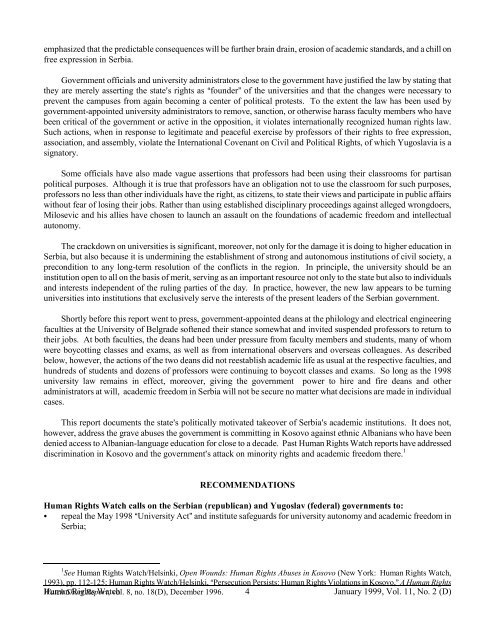DEEPENING AUTHORITARIANISM IN SERBIA: - Human Rights Watch
DEEPENING AUTHORITARIANISM IN SERBIA: - Human Rights Watch
DEEPENING AUTHORITARIANISM IN SERBIA: - Human Rights Watch
You also want an ePaper? Increase the reach of your titles
YUMPU automatically turns print PDFs into web optimized ePapers that Google loves.
emphasized that the predictable consequences will be further brain drain, erosion of academic standards, and a chill on<br />
free expression in Serbia.<br />
Government officials and university administrators close to the government have justified the law by stating that<br />
they are merely asserting the state=s rights as Afounder@ of the universities and that the changes were necessary to<br />
prevent the campuses from again becoming a center of political protests. To the extent the law has been used by<br />
government-appointed university administrators to remove, sanction, or otherwise harass faculty members who have<br />
been critical of the government or active in the opposition, it violates internationally recognized human rights law.<br />
Such actions, when in response to legitimate and peaceful exercise by professors of their rights to free expression,<br />
association, and assembly, violate the International Covenant on Civil and Political <strong>Rights</strong>, of which Yugoslavia is a<br />
signatory.<br />
Some officials have also made vague assertions that professors had been using their classrooms for partisan<br />
political purposes. Although it is true that professors have an obligation not to use the classroom for such purposes,<br />
professors no less than other individuals have the right, as citizens, to state their views and participate in public affairs<br />
without fear of losing their jobs. Rather than using established disciplinary proceedings against alleged wrongdoers,<br />
Milosevic and his allies have chosen to launch an assault on the foundations of academic freedom and intellectual<br />
autonomy.<br />
The crackdown on universities is significant, moreover, not only for the damage it is doing to higher education in<br />
Serbia, but also because it is undermining the establishment of strong and autonomous institutions of civil society, a<br />
precondition to any long-term resolution of the conflicts in the region. In principle, the university should be an<br />
institution open to all on the basis of merit, serving as an important resource not only to the state but also to individuals<br />
and interests independent of the ruling parties of the day. In practice, however, the new law appears to be turning<br />
universities into institutions that exclusively serve the interests of the present leaders of the Serbian government.<br />
Shortly before this report went to press, government-appointed deans at the philology and electrical engineering<br />
faculties at the University of Belgrade softened their stance somewhat and invited suspended professors to return to<br />
their jobs. At both faculties, the deans had been under pressure from faculty members and students, many of whom<br />
were boycotting classes and exams, as well as from international observers and overseas colleagues. As described<br />
below, however, the actions of the two deans did not reestablish academic life as usual at the respective faculties, and<br />
hundreds of students and dozens of professors were continuing to boycott classes and exams. So long as the 1998<br />
university law remains in effect, moreover, giving the government power to hire and fire deans and other<br />
administrators at will, academic freedom in Serbia will not be secure no matter what decisions are made in individual<br />
cases.<br />
This report documents the state=s politically motivated takeover of Serbia=s academic institutions. It does not,<br />
however, address the grave abuses the government is committing in Kosovo against ethnic Albanians who have been<br />
denied access to Albanian-language education for close to a decade. Past <strong>Human</strong> <strong>Rights</strong> <strong>Watch</strong> reports have addressed<br />
discrimination in Kosovo and the government=s attack on minority rights and academic freedom there. 1<br />
RECOMMENDATIONS<br />
<strong>Human</strong> <strong>Rights</strong> <strong>Watch</strong> calls on the Serbian (republican) and Yugoslav (federal) governments to:<br />
C repeal the May 1998 AUniversity Act@ and institute safeguards for university autonomy and academic freedom in<br />
Serbia;<br />
1 See <strong>Human</strong> <strong>Rights</strong> <strong>Watch</strong>/Helsinki, Open Wounds: <strong>Human</strong> <strong>Rights</strong> Abuses in Kosovo (New York: <strong>Human</strong> <strong>Rights</strong> <strong>Watch</strong>,<br />
1993), pp. 112-125; <strong>Human</strong> <strong>Rights</strong> <strong>Watch</strong>/Helsinki, APersecution Persists: <strong>Human</strong> <strong>Rights</strong> Violations in Kosovo,@ A <strong>Human</strong> <strong>Rights</strong><br />
<strong>Human</strong> <strong>Watch</strong> Short <strong>Rights</strong> Report, <strong>Watch</strong> vol. 8, no. 18(D), December 1996. 4 January 1999, Vol. 11, No. 2 (D)
















